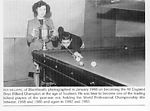The Cradley Heath Workers' Institute, or the “Stute” as it became known by local people, was used as a community centre for the area. The main hall and the smaller offices were available for rent. A wide range of events took place at the “Stute”, from a quiet game of chess, to a party open to the whole community.
There were social evenings with music, dancing, games, tea and refreshments. Apparently, one of the members of the social club enjoyed playing practical jokes. One of his favourites was to bring in rubber coat hooks, so that every time people hung up their coats, they fell down again. Children's parties were organised , for the children whose fathers were out of work. Even yo-yo competitions were held on the stage in the hall. Wedding receptions were held in the committee room upstairs. Food for such events was brought up from the kitchens downstairs.
A former resident of Cradley Heath recalled “Eli's Drunken Band” using the committee room to practise. Everyone knew when they were rehearsing, because the music could be heard coming from the windows. The band was known locally as "Eli's Drunken Band", because of Eli's habit of having a drink before rehearsals.
In 1934 boxing matches were staged in the main hall. It seems that there were only four such matches, however, suggesting that perhaps the Institute was not an ideal venue for such events. In 1935 the main hall was leased to British Billiard Halls Ltd., which was surprising as the floor of the main hall was raked (sloping).
The tables were arranged with their long sides parallel with the sides of the hall, and their feet jacked up at the low end. There were sixteen tables in the hall, which placed them closer together than the regulation "cue and a half" apart. The Institute was used for practice, with league games being played at local labour and liberal clubs. A local resident of Cradley Heath, who has shared his memories with the Museum, recalls Rex Williams playing at the Institute. He was the All England Billiards Champion at the age of fourteen, and later became World Professional Champion.
A thirty minute game, cost 6d (2.5p) for billiards and 9d (4p) for snooker. There was a small, round, coke-fuelled stove, which was the room's only form of heat. The hall was open every day, except on Sundays, and continued to operate as a billiard hall until June 1956, when the trustees received a better offer for the lease of the main hall from the Ministry of Works, on behalf of the Post Office.
Rollover the captions in the box to see the available images in thumbnail format, click the caption to see the full-size image
| Reference: | 703 |
| Keywords: | |
| Archive Ref: | |
| Updated: | Wed 4 Jul 2007 - 09 |
| Interpretation written by | Louis Howe |
| Author's organisation | Curatorial |
| Organisation's website |
